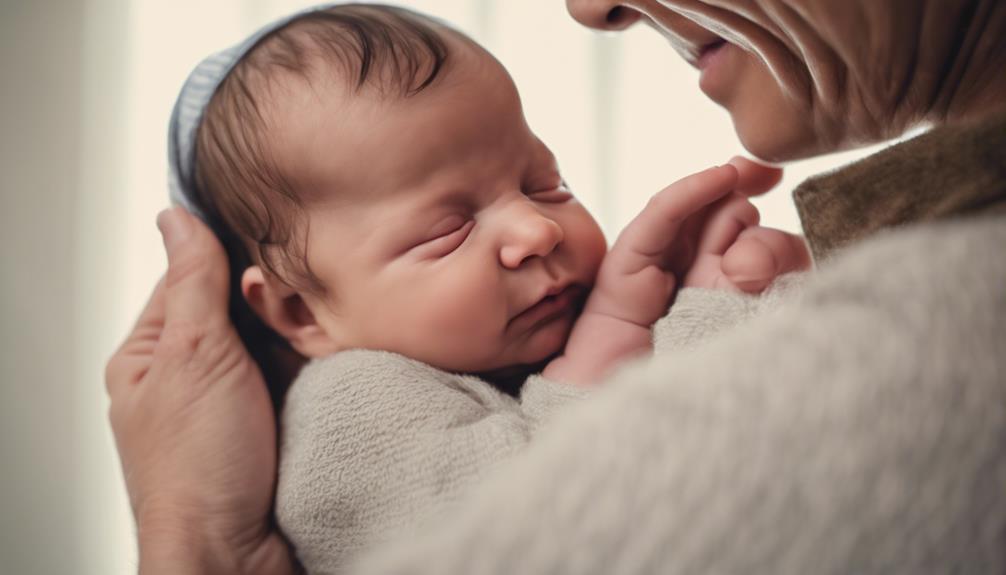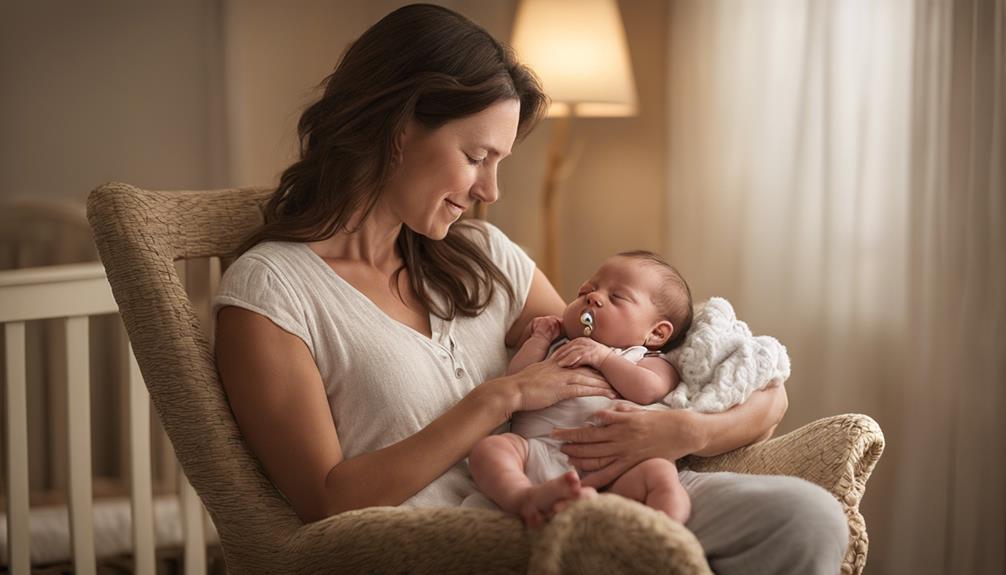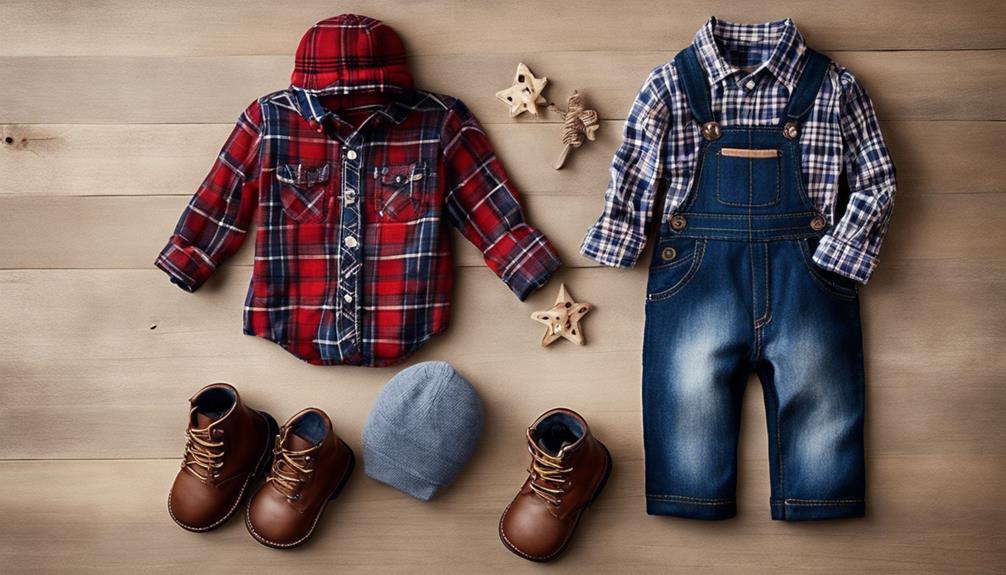If you've ever felt like newborn hiccups are an insurmountable challenge, fear not, for there are effective ways to alleviate them quickly.
Imagine this: your little one peacefully hiccup-free in a matter of minutes. But how can you achieve this seemingly miraculous feat?
Let's explore some practical tips that can offer instant relief to your hiccuping baby, leaving you both in a state of serene calmness.
Key Takeaways
- Burp your baby frequently to release trapped air and reduce hiccups.
- Use a pacifier to relax the diaphragm and stop hiccups quickly.
- Adjust your baby's feeding position to prevent hiccups and aid digestion.
- Implement preventive measures like proper feeding techniques to minimize the occurrence of hiccups.
Causes of Newborn Hiccups
Wondering why your newborn is experiencing those pesky hiccups? Newborn hiccups are often caused by the immaturity of their digestive system. When babies feed, they may swallow air along with milk, leading to those adorable but bothersome hiccups. Factors like overfeeding, a too rapid feeding pace, or sudden temperature changes can also trigger hiccups in your little one.
Stress, excitement, or even the position in which your baby is feeding could contribute to this common occurrence. Keeping in mind that while newborn hiccups are typically harmless, persistent hiccups might signal an underlying issue that needs attention. Understanding the causes of your baby's hiccups can help you navigate this phase with more confidence and ease.
Quick Remedies for Hiccups

To quickly alleviate your newborn's hiccups, try burping them during and after feeding to release trapped air and provide relief. Sometimes, a pacifier can work wonders by relaxing the diaphragm and leading to a quick resolution of hiccups.
If hiccups persist, gently rubbing your baby's back or rocking them in your arms can help relax the diaphragm and ease the discomfort. Changing your baby's position, such as holding them upright against your shoulder, can also aid in stopping hiccups promptly.
Remember to opt for safe and gentle remedies tailored for newborns, avoiding adult or traditional methods which may not be suitable. By incorporating these simple yet effective techniques, you can help your little one find comfort and relief from those pesky hiccups in no time.
Effective Positioning Techniques

Position your baby upright after feeding to harness the power of gravity in aiding digestion and relieving hiccups efficiently. By positioning your newborn in specific ways, you can help alleviate their discomfort caused by hiccups. Here are some effective positioning techniques to relieve hiccups:
| Positioning Technique | Description | Benefits |
|---|---|---|
| Upright Position | Hold your baby against your chest with their head on your shoulder to help release trapped air | Aids in burping and reduces hiccups |
| Stomach Across Lap | Place your baby on their stomach across your lap, gently patting their back to release air | Assists in releasing trapped air |
| Forward-Leaning Position | Hold your baby slightly forward, supporting their chin, and pat their back | Promotes burping and alleviates hiccups |
These techniques leverage gravity and gentle movements to facilitate the release of trapped air, aiding in digestion and minimizing hiccups. Remember to keep your baby calm and relaxed during feedings to reduce the likelihood of hiccups occurring.
Preventing Future Hiccups
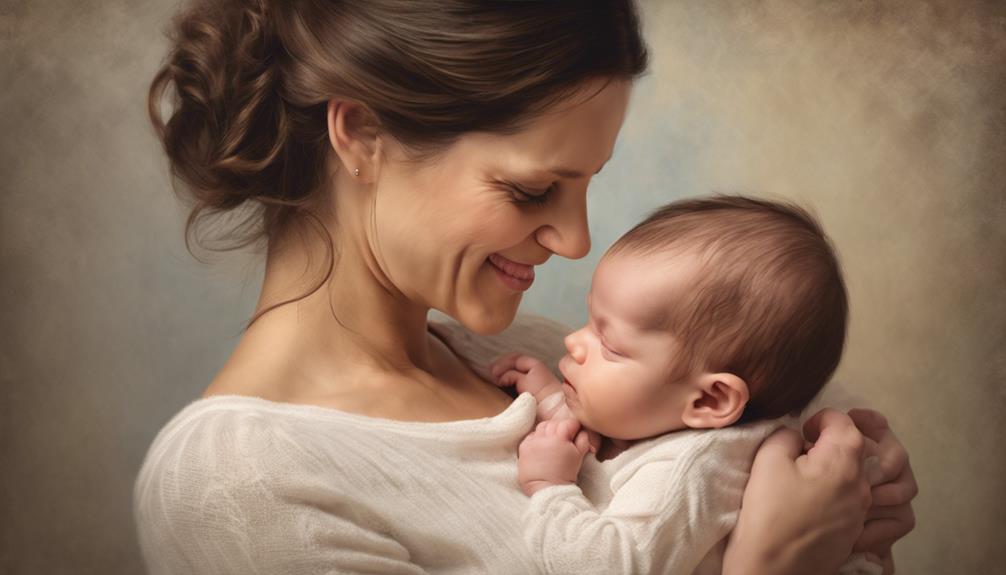
To prevent future hiccups in your newborn, focus on implementing proper feeding techniques and guaranteeing a proper latch during feedings. Here are some tips to help you prevent hiccups in your little one:
- Offer smaller, more frequent feedings to prevent overfeeding and reduce the chances of hiccups.
- Keep your baby in an upright position after feeding to aid in digestion and minimize the occurrence of hiccups.
- Guarantee a proper latch during feedings to prevent your baby from swallowing excess air, which can lead to hiccups.
When to Seek Medical Advice
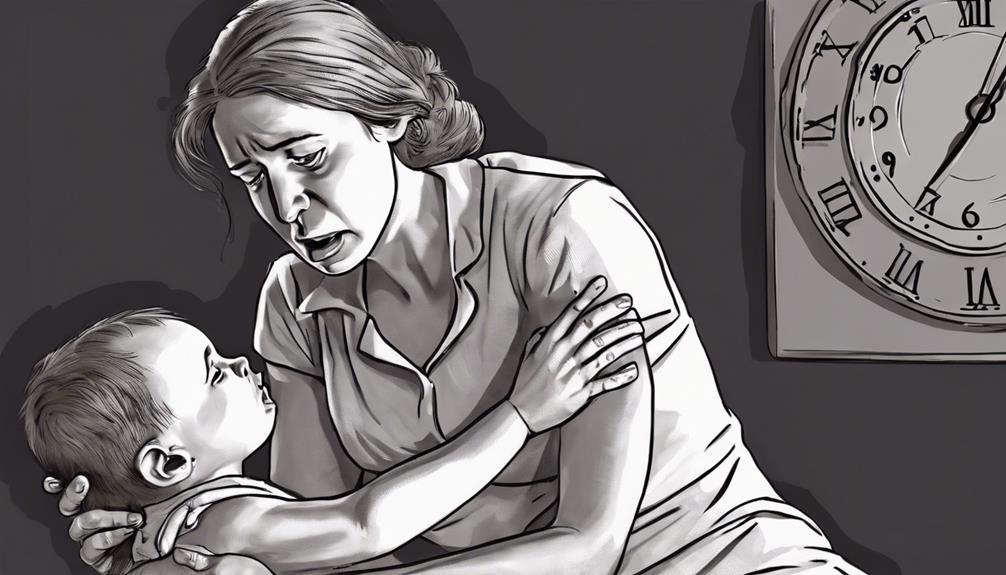
If your newborn experiences persistent hiccups that disrupt their feeding or sleeping routines, seeking medical advice promptly is essential. While newborn hiccups are common, prolonged episodes lasting for hours without improvement may indicate an underlying issue. Contact a healthcare provider if your baby's hiccups are affecting their feeding patterns or causing disturbances in their sleeping patterns.
It's important to seek medical advice if the hiccups are accompanied by concerning symptoms such as vomiting or fever. Additionally, if your newborn appears distressed or in pain due to the persistent hiccups, consulting a pediatrician is recommended.
Frequently Asked Questions
How Do I Relieve My Newborns Hiccups?
To relieve your newborn's hiccups, try burping during and after feedings, offer a pacifier, change their position to upright, and gently rub their back while supporting their head. Avoid adult remedies. Keep it gentle and comforting.
Is It OK to Lay Baby Down With Hiccups?
It's safe to lay your baby down with hiccups. Most babies sleep fine with hiccups and will outgrow them. If hiccups bother during sleep, try gentle soothing. Monitor and seek advice if h hiccups persist or cause concern.
What Is the Best Position for Baby Hiccups?
To help your baby with hiccups, hold them upright against your chest or in a slightly forward-leaning position. Keep them calm and gently pat or rub their back. Avoid sudden movements. These techniques can assist in resolving hiccups quickly.
Do Hiccups Mean Baby Is Full?
Do hiccups mean your baby is full? Not necessarily. Hiccups in babies can happen for various reasons, like swallowing air or immature digestive systems. Understanding hunger cues is key to responding well to their needs.
Conclusion
To sum up, getting rid of newborn hiccups quickly can be as simple as burping your baby or using a pacifier. Just like a gentle breeze blowing away clouds, these remedies can help ease your little one's discomfort.
Remember to create a calm feeding environment and seek medical advice if hiccups persist. Your baby's well-being is always a top priority.
